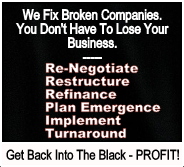Your business is said to break even at that precise point where your net profits [your price per unit less your variable cost per unit] x [your total volume of units sold] equals your fixed costs in total. If you don't breakeven, you will incur a loss, and eventually have to go out of business or play golf with the right politician or lobbyist so you can be subsidized as your continue to fail.
Bailouts? No such thing. They're really subsidized, prolonged losses. From an "Economic Darwinism" point of view, they are bad for any business (eventually), and terribly bad for any nation's economy. Borrowing to cover losses is habit-forming [please read the package insert from your prescribing banker!].
A business which cannot breakeven is an inherent failure. And these expensive abominations usually come into to being from their very inception because an entrepreneur, a strategic business planner, a project manager, or some other person builds a plan upside down.
The right questions to ask before you go into a business are:
1) What is the demand for the product? -- The total existing and potential market demand?
2) What share of the market might we be able to capture?
3) What is a competitive selling price per unit for the product?
4) What is the variable cost per unit, or variable cost of goods sold (COGS)?
5) What is the incremental gross profit per unit (the selling price/unit - the variable cost/unit)
6) What is the minimum overhead "threshold" recurring or fixed cost required to be in this business?
The wrong questions TO ASK before going into a business are:
1) What will the fixed costs (overhead) that I'll require per month to be in this business?
2) How much gross profit must we generate to cover that (given) overhead?
These are ridiculous questions because they are not based upon any market justification. They are based built upon recovery of some arbitrary cost, i.e., if I build a big factory, how much chocolate must I sell at what price in order to justify my expensive facility. That is backwards. And it is surprisingly popular in industrialized, wasteful societies where many companies put many priorities before profits. And profitability is every business' first objective. If it is not, what you are planning on building is not a business -- for better or worse, it is something else.
"The premise about overhead is that it is an enemy to be overcome, and not a a pet alligator to be fed." - Douglas E. Castle
The sacred objective is to MAXIMIZE PROFIT MARGIN AND VOLUME WHILE MINIMIZING OVERHEAD to the greatest extent reasonably possible.
To be continued...
Douglas E. Castle for The Business And Project Planning And Management Blog











No comments:
Post a Comment